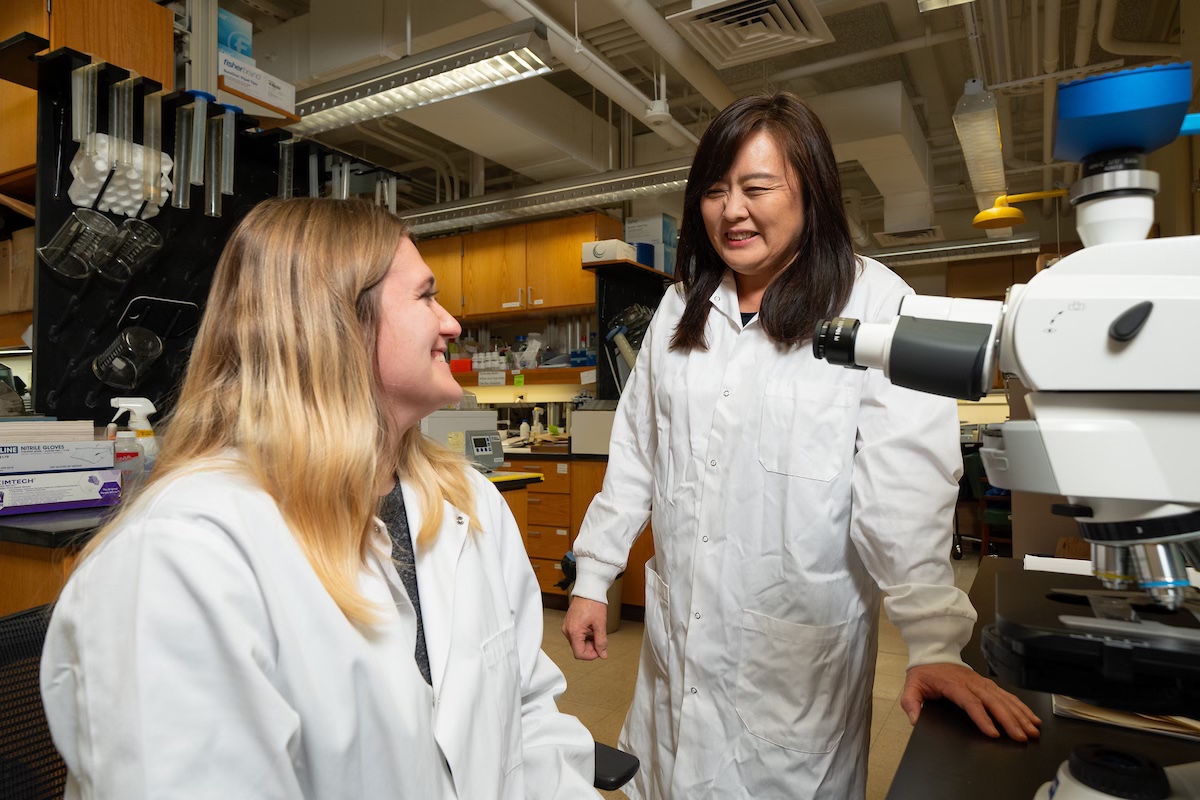Behind the Research: Sujoung Shim
About the feature
Many people are involved in the remarkable range of programs, services and facilities that undergird research in the College of Agriculture. Collectively they’re integral to the college fulfilling its research mission. “Behind the Research” explores their individual roles. Each academic year, we profile six people whose work supports the College of Agriculture’s global reputation for developing innovative, multidisciplinary solutions to challenges and then putting those solutions into action.
Sujoung Shim, Research Associate, Botany & Plant Pathology
Plans and coordinates field activities, ensuring that fungal treatments are applied correctly and data is collected in a timely manner.
Responsible for laboratory maintenance and safety, ordering and inventory management, and safety training and compliance.
Provides mentorship and support to undergraduate and graduate students on lab techniques, experimental procedures and data analysis.
Sujoung Shim’s career has run the science gamut. She has an undergraduate degree in biology from her native South Korea, a second undergraduate degree in pharmaceutical sciences from Purdue, and a master’s in public health from Purdue. Her first job after her public health degree was in diabetes education in the IU hospital system. Her current job involves a very different kind of health: plant health. As a research associate in Darcy Telenko’s field crop pathology lab, she coordinates research on plant diseases like tar spot, gray leaf spot, and northern corn leaf blight disease of corn. It’s a very different kind of work than what she’d initially imagined for herself, but she loves it.
“With disease management, we help people, farmers, and industry,” she says.
Though Shim liked some parts of her job as a hospital diabetes educator, she soon realized there was little in the way of career advancement. She also missed research. When she heard of a Purdue lab needing a manager, it was a clear opportunity. When the first professor she worked for retired, she quickly transitioned into Telenko’s then-new lab. She’s been there for five years now.
“I’m proud of myself for managing all the students and projects,” she says. “Throughout the year, we have a lot of things to do and I have to manage all of them.”
‘A lot of things to do’ is something of an understatement. Telenko’s lab is large, with eight research sites across the state, 10 lab members, and 60 to 70 projects on the go at any given time. Shim’s responsibilities are both complex and expansive. Some of her work happens at a desk: she helps plan all the lab’s projects, from the development of research protocols to coordinating field activities. She collects, manages and analyzes data, maintaining records of all experimental data to ensure its integrity. She contributes to final research reports, and assists with publication of books and manuscripts. Other work is at the lab bench: she works with fungal isolates, identifying and characterizing different pathogens, as well as preparing fungal inoculum for field and laboratory trials.
She’s currently involved in a project evaluating the impact of various factors on tar spot disease in corn. Factors that can influence the disease include tillage practices, hybrid types, and fungicide application.
“This project provides valuable insights into the most effective strategies for managing tar spot disease in corn and contributes to the development of sustainable and effective disease control practices for corn production,” she says.
Other work happens on the lab floor: as lab manager, she’s responsible for maintaining a safe and organized lab environment. This means making sure all lab workers, from students to staff to visiting faculty follow proper lab hygiene and safety protocols. Shim does all the lab’s ordering and inventory management, making sure there’s always an adequate inventory of lab supplies and equipment. She also does equipment maintenance and troubleshooting – if a piece of equipment is down, that can result in costly delays. Shim prevents this by regularly assessing equipment and coordinating with service technicians for repair and maintenance.
Still other work is more people-focused. Shim supports and mentors undergraduates and graduate students, showing them the ropes of lab work and scientific research fundamentals. It’s very important to her that students feel supported.
“I foster a positive and collaborative environment where students feel comfortable asking questions, seeking assistance, and developing their research skills,” she says.
When she’s not working, she enjoys exercise, taking part in campus events, and spending time with her husband and her son, currently a freshman studying pharmacy at Purdue.
“After moving here to pursue my education, West Lafayette quickly became my home,” she says. “I appreciate the welcoming and inclusive atmosphere, with a diverse student body and a lack of prejudice towards international students.”
As for the future, she hopes to keep developing her knowledge and skills, learning more about advanced molecular techniques, disease diagnostics, and data analysis. She’s constantly looking for ways to improve, participating in workshops, conferences and online courses.
“These experiences have been invaluable in developing my research skills and expanding my knowledge,” she says. “I am incredibly grateful for the opportunities and experiences that Purdue has provided me. It has been a challenging yet rewarding journey.”






